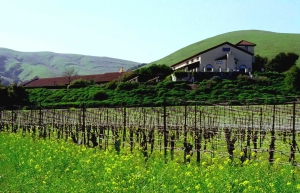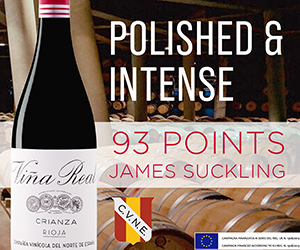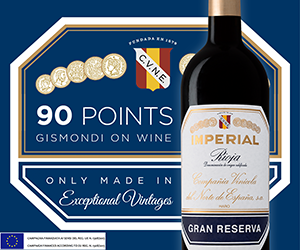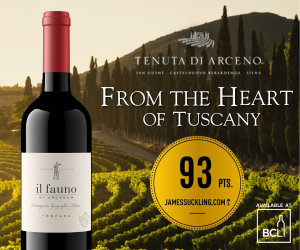Sonoma, CA, August 1, 2007 - Internationally recognized for research on the effects of climate change in the wine industry, Pancho Campo, Spanish wine educator and founder of the Wine Academy of Spain, addressed more than 120 influential winegrowers, vintners and media, representing countries as far away as Spain, Great Britain and Argentina, at Gloria Ferrer Caves & Vineyards on Monday, July 30, 2007.
Sonoma, CA, August 1, 2007 - Internationally recognized for research on the effects of climate change in the wine industry, Pancho Campo, Spanish wine educator and founder of the Wine Academy of Spain, addressed more than 120 influential winegrowers, vintners and media, representing countries as far away as Spain, Great Britain and Argentina, at Gloria Ferrer Caves & Vineyards on Monday, July 30, 2007.
Campo's vision for the seminar was to share the climate change research he compiled for his dissertation in preparing to become Spain's first Master of Wine. The seminar was also a prelude to Campos World Meeting on Climate Change in the Wine Industry, to be hosted in Barcelona, Spain, in February 2008 with Vice President Al Gore as the keynote speaker.
"Combating climate change starts with all of us," asserted Campo. Likening his audience to grains of sand, Campo stressed the importance of
each individual winegrowers efforts to monitor their energy consumption and reduce the wine industry output of CO2 emissions.
Campo was joined by Dave Smart, John Garn and Paul Dolan, three of northern California's most highly regarded experts on environmental issues, who offered local and global insights. The presentations by this panel explored topics ranging from the scientific basis of identifying climate change and potential consequences; observed impacts in worldwide wine producing regions; pests and diseases related to climate change; and solutions on how to decrease the wine industry's carbon footprint.
"The cycle has been broken," warned Campo. The industry must find a way to control the emissions of greenhouse gases, thereby maintaining a consistent level of carbon dioxide in the atmosphere. Global temperatures have been steadily increasing over the last 140 years, with 12 of the warmest years on record having occurred within the last two decades.
"The amount of CO2 on the planet right now is the highest in recorded history," said Campo, who referenced the Intergovernmental Panel on Climate Change (IPCC) statistics taken from compacted ice samples around the north and south poles from the past 400,000 years.
As wine regions across the globe get warmer, many of the traditional grapes that are usually cultivated in each region will find it increasingly difficult to thrive. Adverse effects will be earlier harvests, off flavors, higher alcohol levels at earlier stages, and grapes that are more susceptible to sunburn and disease. The biggest problem is in reduced acidity, when grapes shut down due to extreme heat at a time when phenolic maturity has not yet been achieved, causing loss of freshness, complexity and aromas and even aging potential.
UC Davis Professor of Viticulture and Enology Dr. David Smart noted, "Our ability to store water for agriculture will become a problem," suggesting that one solution is to initiate an IPCC statewide document in California. As one of Californias foremost specialists on climate change, Dr. Smarts research program examines nitrogen use and carbon sequestration by California perennial crops.
"Sustainability is not a destination, it is a direction you have to set," said John Garn. Garn has been instrumental in working with the California Wine Institute to create the Code of Sustainable Winegrowing Practices (SWP), a voluntary self-assessment test that has been widely embraced by Sonoma County vintners and growers. He stressed that the wine industry needs to embrace water and energy conservation and green building techniques in continuing its effort to minimize harmful environmental impacts. "We need a shared understanding to begin the dialogue," said Garn, who optimistically cited many examples of wineries recycling with wastewater ponds, using solar energy and other creative ways to conserve energy and lower CO2 emissions.
Paul Dolan, president of the Mendocino Wine Company, the nations first carbon neutral winery, and the man responsible for initiating organic viticulture and sustainable business practices at Fetzer Vineyards, warned that if we continue to operate the way we have, the world will be depleted of all of its natural capital within the next two centuries. "We cant close our eyes. There is too much to do," he urged.
"It took 2 billion years to create an eco-system that we have already depleted in 200 years," stated Dolan. Wineries need to be proactive in reducing their dependence on fossil fuels and begin investing in sustainable solutions such as wind, solar and biodiesel. This is a call for open forums in which wineries come together to brainstorm on how to collaborate in doing business in a more socially equitable manner. Many solutions were proposed during the seminar that wineries can proactively embrace to counteract some of these environmental impacts.
"Business must change or no one will care about wine. The solution is simple. If we all do a little in our winery, we can change this in 25 years," noted Campo. Reminding his audience of the global nature of this issue he concluded, "This sky is connected to my sky, your ocean is connected to mine. Together we can create the future that we wish for our children to inherit."

 quicksearch
quicksearch






